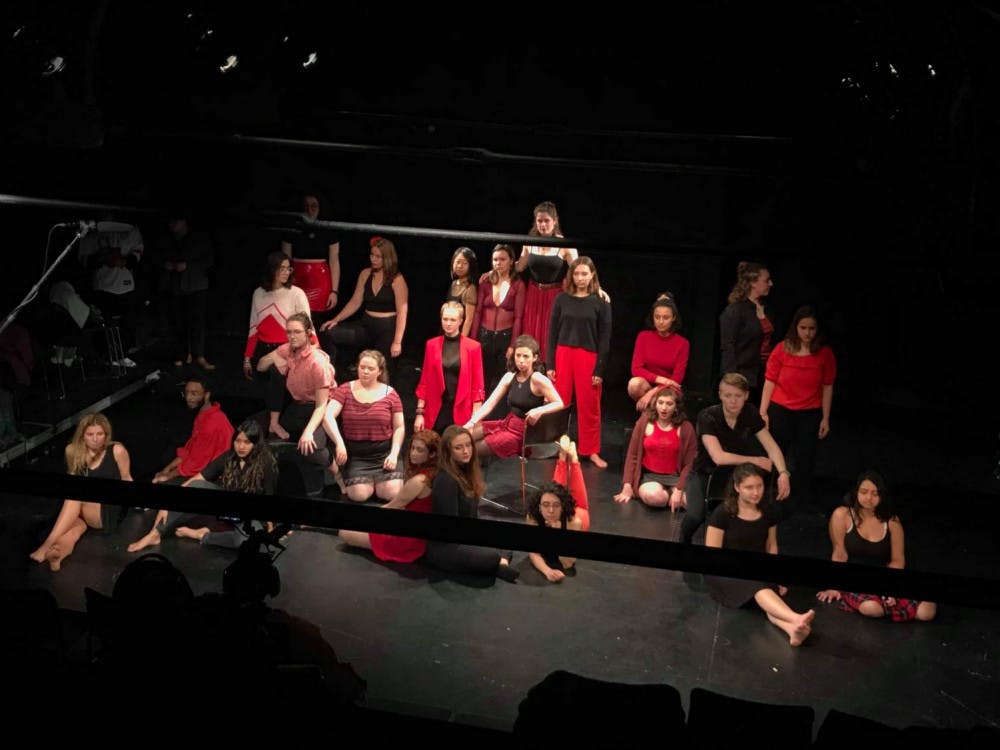This Friday night in Hepburn Zoo, as I watched the full cast of womyn and femmes dressed in red and black perform My Revolution Begins in the Body, the opening monologue of this year’s Beyond the Vagina (Monologues), I found myself remembering a cab ride I took through Delhi one Saturday night in September.
Beyond the Vagina (Monologues) is a collection of performance pieces in the tradition of Eve Ensler’s groundbreaking 1994 feminist theater piece “The Vagina Monologues.” In September I was on my way home with my friend Maya, driving through the chaotic streets of Delhi and talking about the performance by Indian dancer and theater artist Maya Krishna Rao we’d just watched called “Loose Woman.”
The two performances were, of course, quite different. Rao wore rope sandals and makeup that was dramatic, bordering on grotesque, as she stomped and gestured in the kathakali style (a form of traditional Indian dance historically performed by men) while delivering her monologue. I’m sure I missed ninety-nine percent of the meaning she was trying to convey, given my limited understanding of Hindi, Indian culture and dance, but I was nonetheless captivated by Rao’s commanding strength and charisma for the entire two-hour performance.
Beyond the Vagina (Monologues) was in English, performed by my classmates and mostly devoid of dancing — with the notable exception of Caleb Green’s beautiful original choreography to Andrea Gibson’s “Your Life” – but the entire performance still viscerally reminded me of Rao’s “Loose Woman.” Both performances illustrate the palpable, undeniable power of a woman unapologetically taking up space, power that’s recognizable in a way that can transcend the particulars of language and culture.
Empowering female and non-binary identifying individuals wasn’t the only goal of the Monologues. Breaking the silence was another. Co-directors and producers Stella Boye-Doe and Steph Miller say that they hope the show starts conversations that continue on campus. “It’s about breaking down stigma, starting to talk about things that are taboo right now,” said Miller.
Described in the program as having “a new eye for inclusivity and intersectionality,” Beyond the Vagina (Monologues) builds on the 1996 “Vagina Monologues” by “recogniz[ing] the extent to which our global conversations of womanhood, femme, gender, sexuality and identity have changed and grown.” Boye-Doe and Miller spent winter term selecting the monologues and pieces that would speak to a contemporary, diverse feminism.
After only about three weeks of rehearsals, the company put on a show that covered a range of subjects, from sex and pleasure, to assault and trauma, to gender identity. In addition to three original monologues written and performed in this year’s show, there were also sketches and monologues from Ensler’s original script, as well as past performances of Beyond the Vagina (Monologues).
The range of topics was matched only by the range of tones struck by the performers over the course of the night, and sometimes in a single scene. A monologue called “MeToo is a movement, not a moment,” adapted from a TED Talk given by the movement’s founder Tarana Burke, made me tear up. Immediately afterwards, two women armed with dark red lollipops came on stage for “Reclaiming Cunt,” poetically reminding the audience of the power of a woman in command of her own sexuality. A funny song about what a scary time it must be to be a man was followed by a group of women talking about their vaginas, gracefully moving between humor, relatability and exasperation. After one woman helps another find her clitoris in “Clit” with perfect comedic timing, sex positivity and a little help from a mirror, a large portion of the company implored the audience to embrace their flaws and imperfect humanity — their “ugly” — and remember that “you are magnificent,” in the final monologue, “Moving Towards Ugly.”
More could be said about each component piece that comprised this year’s Beyond the Vagina (Monologues). But Maya’s words in the cab that night after watching Rao dance in September best capture the feeling I walked out of Hep Zoo with on Friday: “That made me feel like I don’t at all want to be a woman who is quiet.”
Beyond the Vagina (Monologues) Speaks to Contemporary, Diverse Feminism

COURTESY PHOTO
Comments



